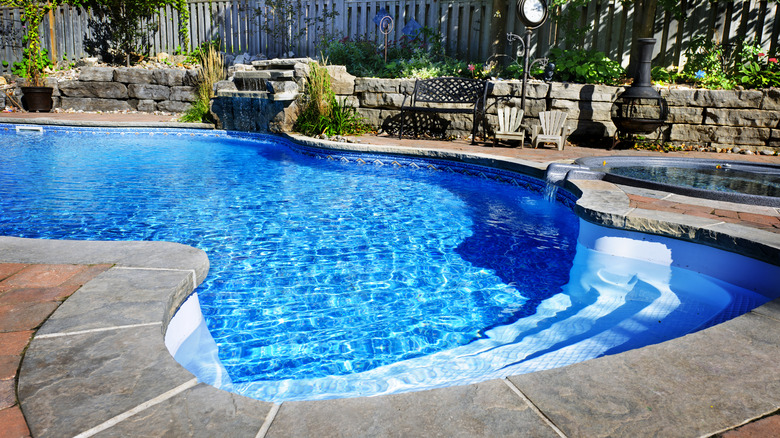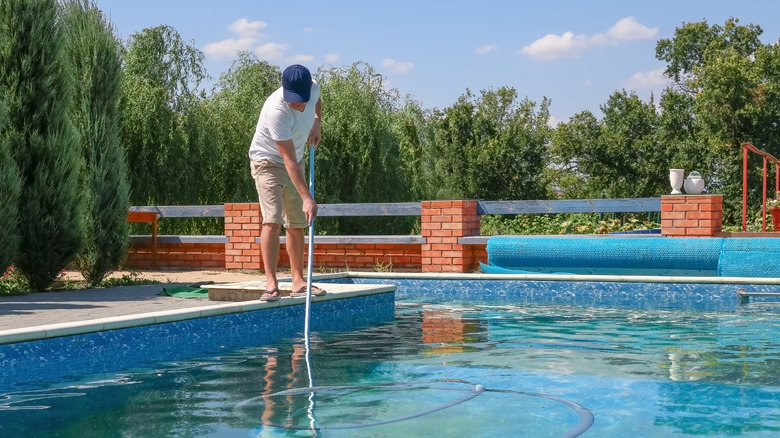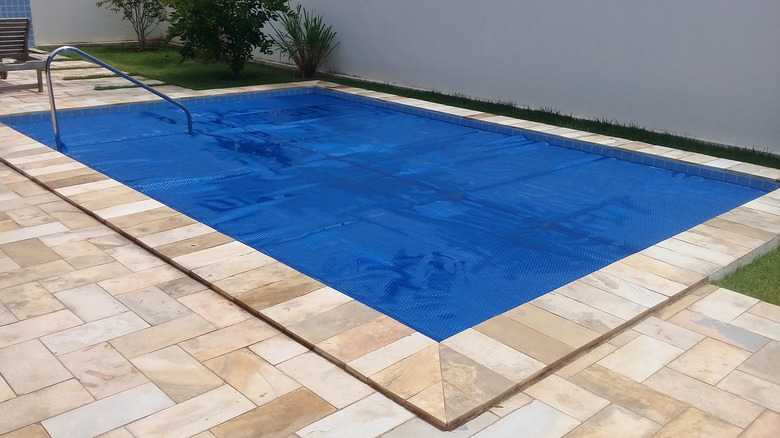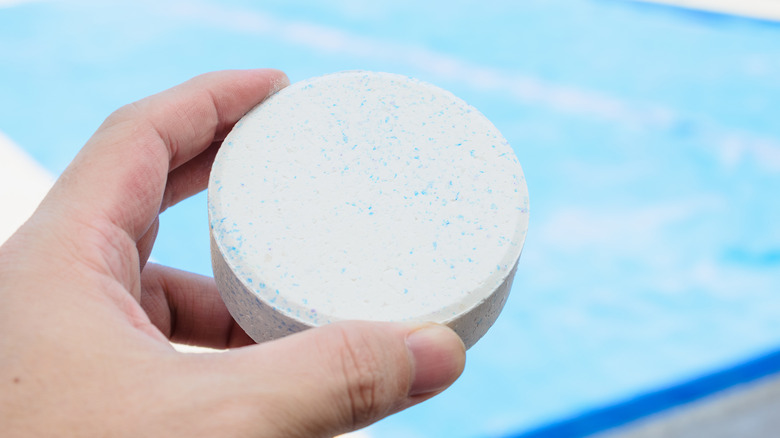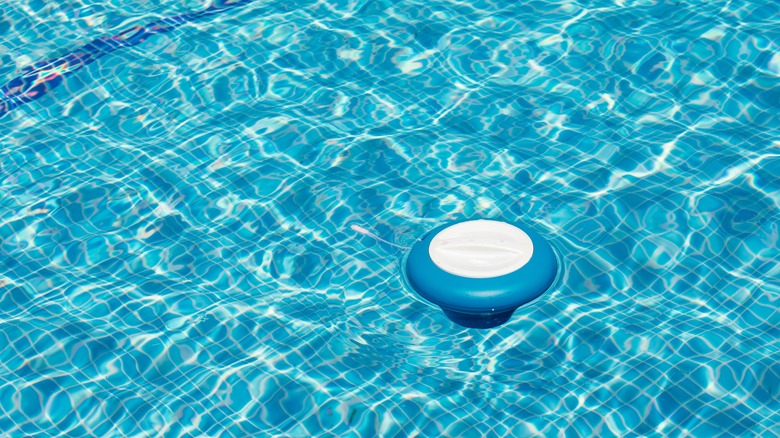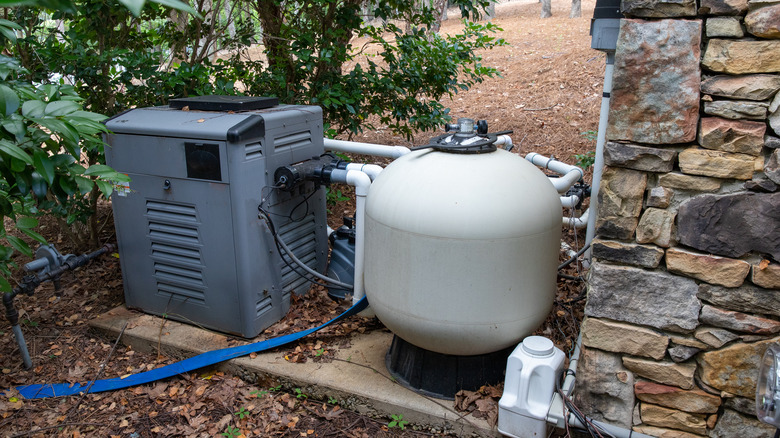5 Ways To Prevent Your Pool From Freezing This Winter
Having a pool, whether inground or above ground, is an excellent home luxury and amenity you can enjoy during the warmer months. However, they also require a lot of upkeep when in use and closed. During the spring and summer, when your pool is open, you must keep it clean and in good shape and prepare it for the winter.
Keeping your pool from freezing in the colder months is incredibly important. The issue isn't just the water freezing, which would then need to be thawed and replaced, but the other serious side effects that come from a frozen pool. A frozen pool can lead to the pipes bursting, the pool liner either cracking or expanding and the filter completely breaking or cracking, according to Aqua Haven Spas. At best, it will take significantly more time and money to reopen your pool next season. At worst, your pool could be permanently damaged. This is why you must learn how to keep your pool from freezing.
1. Prepare and close your pool
Before covering your pool for the winter months, ensure it's clean. Leslie's Poolmart Inc recommends starting the cleaning and prep process at least one week before you intend to close your pool. One of the bigger threats to leaving your pool over the winter is algae, so start by adding a phosphate remover to help prevent it from blooming. This should be done once the water naturally sits at 65 degrees Fahrenheit.
It would help if you also gave your pool a deep clean before closing it down. Use a pool brush to scrub your pool's walls and floor, making sure to be thorough and not skip any debris, algae, dirt, etc. Then, using a pool net or skimmer, remove all surface-level debris, like leaves and sticks. Employ a pool vacuum to make sure it's spotless. Finally, consult your pool manual to see how much you should lower the water levels — usually only a couple of inches.
2. Pool covers
One of the best ways to prevent your pool from freezing over the winter is to cover it adequately. Aside from adding a cover, there are many steps to take, but this prevents snow and ice from damaging the surface, lining, and other pool components. As Swim University points out, winter pool covers also keep out debris. They don't offer much safety, so keep that in mind if you have pets or children.
Ideally, your cover should have grommets that allow you to tie it down securely. Use a cable to firmly attach it over the pool, and then use clips to pin it down further. This still likely won't be enough to weigh it down, so add a few inches of water to the top of the cover. Be aware that too much water, ice, or snow can cause the cover to sink under the surface of the pool water, so you'll have to keep an eye on it and maintain proper weight.
3. Balance your chemical levels
Another important aspect of getting your swimming hole ready for freezing temperatures is ensuring the chemicals in your pool are balanced. This will help prevent freezing and make it much easier to open your pool the following spring or summer. As Neave Group points out, your pool water touches the liner, so you must ensure the chemicals are balanced enough so that the cooler temperatures don't erode the lining.
Ideally, your pool should be in the 7.2 to 7.8 pH level range. You can get digital meters that tell you the pH level in your pool water. If it's too low, consider shocking it, which involves adding chlorine and will raise the pH level and remove any contaminants from the water, via Hayward. Another chemical component you want to pay attention to is alkalinity. For gunite pools, this should be around 80 to 120 parts per million, and for vinyl, 120 to 170. Again, there are strips and digital meters for testing this. You can raise alkalinity with sodium bicarbonate, per WaterGuru.
4. Plumbing lines
One of the most crucial pool components you should prepare for freezing weather is the plumbing and piping. If your pool solidifies, it can cause the pipes to freeze, likely resulting in them bursting, eroding, etc. To begin, PoolSupplies says to first blow out your return lines. Do this by unscrewing the filter to access the return line and using an air blower to blow out all the old water in the line.
Next, it's time to drain the skimmer. Begin by removing the skimmer basket and storing it someplace safe or replacing it for the spring. Then, break out your air blower again to remove all the water from the skimmer, using a skimmer plug to stop more water from coming in. This will also prevent ice and snow from entering the skimmer over winter. Repeat this process with your main drain, closing the valve, so water doesn't flow back into the pipes. Finally, pour diluted antifreeze into your pool pipes, preventing them from freezing over the winter if any water gets in.
5. Keep your pump on
While draining your pool of all water may seem like a good idea in theory to prevent freezing, that couldn't be less true. According to Crystal Pools Inc., an empty pool is much more susceptible to drying out, leading to the liner cracking. Also, any falling debris can majorly damage the pool. Plus, draining your pool and refilling it the next year is a massive waste of water and money.
Allowing water in your pool protects it over the winter, so long as you know how to maintain it. Moreover, keeping your pool water moving should innately prevent it from freezing. Easy Pool Cleaning points out that moving water molecules create friction and heat, which keeps the water from freezing despite intense weather conditions. This can be achieved by simply keeping your pool pump running throughout the winter until it's time to open your pool again in the spring or summer.
